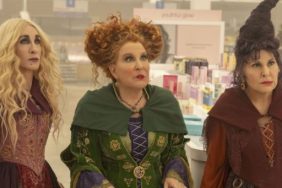Thirteen years and five films later, the Underworld movies have – against all odds – persisted. They are a death march of leather and bullets and wonky color-timing, a mishmash of half-remembered action movie tropes and nü metal, a relic of the bygone era from the post-Matrix early 2000s, when those few elements were all you needed to be culturally relevant. I’ve watched all five of them in the last few days. I felt nothing except a temporary, dumb thrill at the concept of a giant wolfman.
I am technically supposed to review the latest film in the series, Underworld: Blood Wars, but I can’t imagine what the point might be. I’ll say this for the Underworld films, they’ve gotten slightly better with every installment, with niftier action sequences and more coherent visual storytelling. But I think it’s fair to say that they peak at mediocrity, that vague sense that you have indeed watched something akin to a movie. Characters spout important-sounding nonsense about plot points and people that most of us forgot about four films ago, and somehow Kate Beckinsale gets more superpowers and an even cooler haircut, and at one point two hunky dudes scream bullets at one another. A whole war is being fought between vampires and werewolves and somehow it doesn’t have any impact.

Screen Gems
Because what films like Underworld have done is create the illusion of storytelling without actually telling a proper story. We are told that Selene (Beckinsale) and Michael (Scott Speedman, whom the franchise abandoned three films ago and whose absence they’re only just now getting around to explaining) are in love because they kissed twice and had a slow-motion sex scene once. All of their conversations have consisted of exposition about vampires, werewolves, and how vampires and werewolves don’t like each other. And yet their love affair drives the events of the series anyway, as if we somehow believed in their passion or could be convinced that anyone in these movies believed in it either.
It’s a similar situation for Eve (India Eisley), Selene and Michael’s daughter from Underworld: Awakening. That film presented our heroes with a child as suddenly and implausibly as the time Tarzan and Jane just stumbled across a son in 1939’s accurately-titled Tarzan Finds a Son. The idea is that Selene spent twelve years in cryogenic slumber and woke up to find she gave birth to a now-twelve-year-old girl, whose blood is now super important to everyone. But that’s the only reason Selene cares, because it’s not like they have anything resembling a relationship. Even motherhood is an emotionless plot point in the Underworld movies, and one film later that plot point lingers like a nasty cough, one that the movie obviously doesn’t want to deal with but just can’t shake, because it got into the system and needs to be expelled.

Screen Gems
Let’s face it, everything is just a plot point in the Underworld movies, and the plot doesn’t make much sense. Remember the time, back (again) in Underworld: Awakening, when Selene used her magic blood to bring David (Theo James) back to life and then leaves the rest of a whole roomful of dead vampires un-resurrected, even though they also gave their lives to save her daughter and even though her whole species was on the verge of extinction? What was up with that, Selene? And hey, why did it take three films to even explain that there’s an actual difference between “werewolves” and “lycans?”
The Underworld movies look like serious business. They are grimdark and desaturated and boast that sort of superficial sexuality that sells products but has no relationship to real human intimacy. The characters are indestructible badasses who shoot holes in elevators just to punch through them and they develop superspeed abilities on par with The Flash and only use them one time. It’s cool because it looks like it probably should be cool, but upon close or even casual analysis it is devoid of anything other than shiny black clothing and endless conversations about vampire genealogies that would make the Book of Genesis feel smug about how few “begats” it has. Sleep schedules are one of the most important plot points in the first two Underworld movies, and those naps are discussed with the same melodramatic tones one usually reserves for Othello. It just goes on like this.

Screen Gems
There are MVP’s in the Underworld movies, a handful of character actors like Michael Sheen, Bill Nighy and now Lara Pulver who add a welcome theatricality to an otherwise muted cast of characters. But they only serve to further delay the realization that the Underworld movies have all the qualities one might expect to see in a real movie, but none of the substance that makes them actually worth watching. Even notorious cinematic travesties like The Lone Ranger and Gods of Egypt give the distinct impression that someone involved in the production was trying to make a fun movie. They have absurd characters and dumb dialogue and off-putting spurts of ill-advised creativity that went horribly awry, but at least some effort was exerted in an attempt to be amusing and original.
The Underworld movies, in contrast, are a rote series of self-serious mythology lessons, glumly portrayed and intermittently interrupted by stylish action sequences that are so slick that nothing about them sticks. The franchise is practically yelling that it’s important, and nothing that’s actually important needs to go to that much trouble to convince anybody about it. Underworld is not a series of movies, it’s a bottle of placebos. It sells audiences on the idea of an entertaining action franchise without actually providing quality entertainment or action that matters in any way.
But it’s a whole franchise. Go figure.
Top Photo: Screen Gems
William Bibbiani (everyone calls him ‘Bibbs’) is Crave’s film content editor and critic. You can hear him every week on The B-Movies Podcast and Canceled Too Soon, and watch him on the weekly YouTube series Most Craved, Rapid Reviews and What the Flick. Follow his rantings on Twitter at @WilliamBibbiani.








